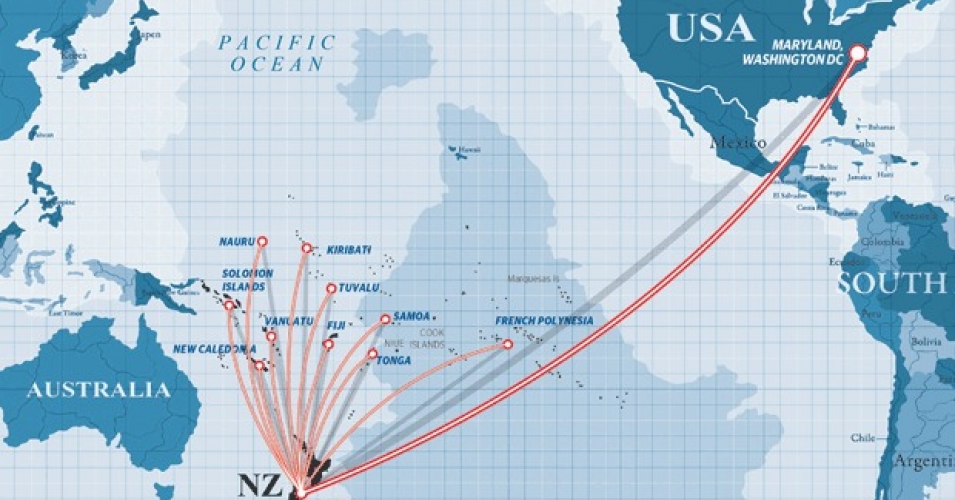Spy Agencies Used 'Giant Vacuum Cleaner' To Collect Data Across Pacific
By Jon Queally
05 March, 2015
CommonDreams.org

'New Zealand’s electronic eavesdropping agency is spying on its neighbors and sharing communications it intercepts in bulk with the NSA through a controversial Internet mass surveillance system,' reports The Intercept. (Image: New Zealand Herald)
New documents from the cache of files leaked by Edward Snowden show that New Zealand's intelligence agency has been collecting in bulk the cell phone, email, and internet files of people across the Pacific Island nations and handing that data over to the U.S. National Security Agency in an operation one angered lawmaker now describes as a "giant vaccum cleaner of information."
Reported jointly by investigative journalist Nick Hagey, the New Zealand Herald and The Intercept, the latest revelations show how the Government Communications Security Bureau (GCSB) was asked "to plug holes" in the NSA's global spying network by carrying out a mass surveillance operation of numerous island nations—including the Cook Islands, Tuvalu, Nauru, Kiribati, Vanuatu, the Solomon Islands, French Polynesia, Samoa, Fiji, and Tonga—many of which route their communications needs through New Zealand.
The journalists reporting the story have also said that additional details about mass surveillance conducting by the GCSB will be forthcoming in the days ahead.
"The Five Eyes countries led by the US are literally trying to spy on every country in the world," Hagey said during an interview with New Zealand Radio, "and what we're going to be hearing about in the next few days is New Zealand in all kinds of very surprising ways playing a role in that," he said.
Prime Minister John Key is under fire over the details and implications of the spying operation in the Pacific even as he tried to downplay their significance.
"Firstly, some of the information was incorrect, some of the information is out of date, some of the assumptions made were just plain wrong," argued Key during a press briefing to reporters. "But we do have the GCSB and it is a foreign intelligence service and it does gather foreign intelligence that is in the best interests of New Zealand and protecting New Zealanders."
According to The Intercept:
GCSB has been designated a geographic “area of responsibility” to monitor communications in the Southwest Pacific as part of Five Eyes efforts to maintain global surveillance coverage, according to the documents. One NSA memo notes that New Zealand provides “valuable access not otherwise available to satisfy US intelligence requirement.” This includes gathering intelligence about trading partners in the Asia-Pacific region and about governments in neighboring islands, the documents show. A New Zealand intelligence source confirmed these details, telling the New Zealand Herald that GCSB was monitoring government ministers and senior officials, government agencies, international organizations and non-government organizations in the South Pacific nations.
The Herald adds:
While the GCSB has always had a role carrying out surveillance on the Pacific, the Snowden documents show it grew massively from 2009.
In July 2009, a GCSB document said there were plans to shift the intelligence base at Waihopai to "full-take collection" (see document on original article). The phrase is one seen in previous Snowden releases and means everything is collected - the content of messages, internet traffic and the data of communications - including telephone metadata, showing who called who.
Later in 2009, the documents showed the GCSB's Waihopai base expected "full-take collection on Mission carriers running by October". The "Mission carriers" are the satellite dishes at the base.
Though not the first time that the New Zealand—one of the so-called "Five Eyes" English-speaking nations which includes the U.S., the U.K., Australia, and Canada—has been implicated in conducting a mass spying operation in conjunction with the NSA, but the extent to which it has used to its strategic geographic position to collect information from its erstwhile allies of these smaller, more vulnerable countries came as a shock to many.
Labour leader Andrew Little told Radio New Zealand he was shocked to hear about the mass spying in the Pacific.
"People expect our security agencies to do their job of targeting information and issues that are a threat to us but not to do a wholesale collection of all electronic information from our south Pacific neighbours. So I think our Foreign Minister and our Prime Minister have some questions to answer in that regard," Little said.
Russel Norman, co-leader of the Green Party in New Zealand, expressed tempered outrage over the revelations as he called it a total attack on the privacy of individuals who have done nothing wrong and a complete abrogation of surveillance powers to a foreign power. Norman told the Herald the revelations were "extremely destructive" to New Zealand's relationship with the Pacific Islands and said the GCSB had been "committing crimes against entire nations" at the cost of being a member of the Five Eyes.
.
Comments are moderated

